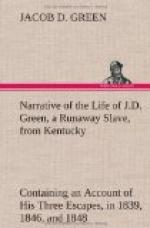In their reply to this appeal, the Scottish ministers do what the Confederate ministers professed their intention of doing—they avoid every thing in the shape of political discussion. Among those gentlemen there is no doubt considerable difference of opinion respecting the two parties in the civil war; but they say nothing of that, and address themselves exclusively to the question of slavery. Happily, there is no difference of opinion upon that point among men who take upon themselves the high office of preaching God’s word in this country. The Scottish Ministers, in powerful and manly language, express the “deep grief, alarm, and indignation” with which they have seen men who profess to be servants of the Lord Jesus Christ defend slavery as a Christian institution, worthy of being perpetuated and extended, not only without regret, but with entire satisfaction and approval. “Against all this,” say they, “in the name of that holy faith and that thrice holy name which they venture to invoke on the side of a system which treats immortal and redeemed men as goods and chattels, denies them the rights of marriage and of home, consigns them to ignorance of the first rudiments of education, and exposes them to the outrages of lust and passion—we must earnestly and emphatically protest.” We believe that this is the answer of the whole British community to the appeal of the Confederate clergy. However much the public sentiment may have been misled respecting the rights and the wrongs of the two parties in the war, it cannot but be sound at the core on the subject of slavery. There are many thousands of people who have not the slightest sympathy with slavery, and who yet sympathise with the slave-owners because they have a vague impression that the Southerners are brave gentlemen and the Northerners base mechanics. They have managed by some strange process to separate the cause of slavery from the cause of the slaveowner, and while they rejoice at every success which tends towards the establishment of a confederacy which is to have slavery as the “head stone of the corner,” they continue to pray as fervently as ever that the fetters of the slaves may be broken. All such people—and they constitute the mass of the Southern sympathisers in this country—must be ready to repudiate with the sternest indignation this attempt to connect the holy religion of Christ with the most horrible oppression which the cruelty and cupidity of man ever created.
But it is not enough that the Confederate defence of slavery should be rejected. It was proper that the Scottish ministers of religion should deal only with the religious aspect of the question, but it is the duty of every man who feels that he has any influence in the world—and there is no man who has not some—to study the political lessons which the address affords. There can be no doubt that the appeal expresses the genuine sentiment of the Southern States, softened down by whatever softening influence there may be in their




